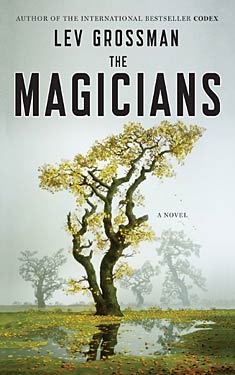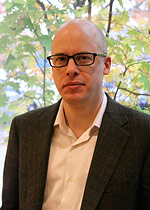Strange Toys by
Patricia Geary
Published: Bantam
Spectra, 1987
Awards Won: Philip K.
Dick Award
Tbe Book:
“Pet is the
youngest daughter in an unusual family.
Her parents—known to her as Stan and Linwood—take a non-traditional
approach to childrearing, but their sophisticated home is turned upside down by
Pet’s oldest sister, Deane. Deane,
the ‘bad child’, became interested in voodoo and unsavory company, leading to
her eventual arrest. When Stan and Linwood go on the run with their other two
daughters, Pet begins to realize that she also has some natural talent for the
occult.
Pet will have three chances to confront the supernatural, to
either use its power or allow it to use her. First, when she is a confused child, trying to protect the
people she loves. Second, when she
is an irresponsible teen, desperate to find some kind of truth. Third, when she is an adult
bodybuilder, dedicated to becoming a powerful woman. Pet must find the strength
to understand both Deane and herself.” ~Allie
This is my first review for WWEnd’s Women of GenreFiction. Therefore, this is my
first Patricia Geary novel, and I picked it up at a secondhand bookstore. This is the second of her four novels,
preceded by Living in Ether (1982)
and followed by The Other Canyon (2002)
and Guru Cigarettes (2005).
My Thoughts:
Strange Toys was
separated into three parts, the three periods of Pet’s life when she
encountered the supernatural. Pet
was a very different person at each point of the journey, and I thought the distinction
between child, teenage, and adult voice was very well done. Since the supernatural part of the
story involved voodoo, the stories tended to revolve more around New Orleans
than Pet’s childhood home of southern California. Each story built to a climactic event, but the first two
ended before actually reaching it.
I found it a little irritating to only see the conclusion through
flashbacks. However, this story is
really about Pet and her development, so I can appreciate that it is more
important to see how she incorporates events into her identity after the
fact. Since the story is broken
into three parts, I’m going to address each stage of Pet’s life separately.
In terms of both story and character, I felt that the
section featuring Pet as a child was the strongest part of the novel. It seemed
to me that Geary captured the perspective of a child remarkably well. Pet’s
information and understanding was limited, and her stable world was as small as
her immediate family. Many of her experiences left me feeling nostalgic for my
own childhood,such as the long car trips, the engrossing games she and her
sister June played with their toys, and the affectionate/bullying relationship
they shared. Since she was a child, she approached the supernatural in a very
matter-of-fact way, with little doubt of the reality of her experiences. Pet didn’t really understand what had
happened with Deane, but she knew that her family was in danger. It was her desire to protect her family
that pushed Pet towards the occult, and pushed the story forward. The tension in the situation always
left me wanting to read more, and I found Pet to be a very sympathetic child protagonist.
I was less engaged with Pet’s teenage incarnation, though I
enjoyed how different she was from child Pet. It seemed that Pet was portrayed
as the popular idea of a typical teenager—preoccupied with makeup, sex, and
partying, and possessing almost no ability to make sensible decisions. I enjoyed learning more about voodoo in
this section, though I wasn’t completely thrilled with how the information was
imparted. Most of it was given through conversations with the extremely
stereotyped Alonso, a much older Native American man with whom she had a brief
sexual relationship. The plot seemed mostly driven by Pet making a series of
remarkably bad decisions, which left me feeling more exasperated by her
character than drawn in by the story.
As an adult, Pet was much more in control of herself and
aware of what she wanted out of life.
In several ways, I could see how different aspects of her past shaped
her adult identity. She lived a strict healthy bodybuilding lifestyle, and, in
a very literal sense, she had made herself very powerful. However, her disdain for less fit
people was a little grating to read. In terms of story, this section seemed
mostly about Pet achieving a sense of closure, so it lacked some of the momentum
and tension of the earlier stages of her life.
Though I favored the story of Pet’s childhood, I enjoyed the
treatment of the supernatural through all three stories. It was always in the
background, and never completely understood. Most of the things that were
affected by magic could also be explained through overactive imagination,
drugs, or simply coincidence. As
one of the strictures of the novel’s voodoo claimed, “Coincidence is the perfect texture.” The story seemed to stress
that there would always be a large element of unknown in the supernatural, and
this was also shown to be true in more mundane life. For instance, though Deane was a major force in Pet’s life,
Pet and the reader only ever know very little about her. This emphasis of the
unknown is also seen the in conclusion of the novel—the significance of the
final events is left open to interpretation. Most questions were not explicitly answered, which I think
it was a fitting end to this kind of story.
My Rating: 3.5/5
Strange Toys tells
the story of the three times Pet encounters the supernatural: once as a child,
once as a teenager, and once as an adult.
Her voice and character are dramatically different in each segment, but
I was most impressed by the portrayal of Pet as a child. I felt like the first section of the
story was also the most interesting narrative, with clear stakes and constant underlying
tension. I found it difficult to
care about Pet as a teenager, as she continued to make one extremely bad
decision after another, and the final section seemed very mild in comparison
with the others. Overall, though, I liked how the supernatural parts were never
fully explained, and how so much of the meaning of the story was left to the
reader’s interpretation. The
ending may be too open for some readers’ tastes, but I think that the
conclusion fit the style of Pet’s story very well.









